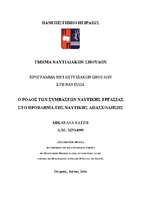Ο ρόλος των συμβάσεων ναυτικής εργασίας στο πρόβλημα της ναυτικής απασχόλησης

Προβολή/
Λέξεις κλειδιά
Ναυτική εργασία ; Συμβάσεις ναυτικής εργασίας ; Ναυτική απασχόληση ; Maritime labour ; Maritime Labour Convention (2006) ; Maritime employmentΠερίληψη
Στόχος της παρούσας μεταπτυχιακής εργασίας ήταν να μελετήσει τα ζητήματα που σχετίζονται με το πρόβλημα της ναυτικής απασχόλησης στην ΕΕ και την Ελλάδα και συγκεκριμένα τη μείωση της ζήτησης του κατώτερου ναυτεργατικού δυναμικού και το σημαντικό έλλειμμα αξιωματικών, το οποίο δημιουργείται από την υποκατάσταση των Ευρωπαίων και Ελλήνων ναυτικών από αλλοδαπούς ναυτικούς χαμηλότερου κόστους, την χαμηλή προσέλκυση νέων στα ναυτικά επαγγέλματα λόγω της κοινωνικής απαξίωσης των επαγγελμάτων αυτών, καθώς και από το πολύπλοκο και ασαφές πλαίσιο των συνθηκών εργασίας και διαβίωσης των ναυτικών που επικρατούσε τις τελευταίες δεκαετίες και έως την εφαρμογή το 2013 της Σύμβασης Ναυτικής Εργασίας (ΜΙΧ) 2006. Η Σύμβαση αυτή καθορίζει ένα ενιαίο πλαίσιο ελάχιστων προτύπων και συνθηκών ναυτικής εργασίας και διαβίωσης, το οποίο αποτελεί τη βάση για τις συμβάσεις ναυτικής εργασίας που εφαρμόζονται τόσο σε πλοία υπό σημαίες κρατών -μελών της ΕΕ, όσο και σε πλοία υπό σημαίες ευκαιρίας, εφόσον το κράτος της σημαίας την οποία φέρει το πλοίο έχει επικυρώσει την ΜΙΧ 2006. Στη συνέχεια η εργασία επικεντρώθηκε στην ανάλυση και σύγκριση των όρων των συμβάσεων ναυτικής εργασίας που εφαρμόζονται και αν οι συμβάσεις αυτές που στοχεύουν στην βελτίωση των συνθηκών εργασίας και διαβίωσης των ναυτικών, συνέβαλαν στην ανατροπή της συρρίκνωσης του ναυτεργατικού δυναμικού και στην προσέλκυση νέων στις ναυτικές σχολές για την κάλυψη του ελλείμματος των αξιωματικών στο μέλλον.
Η εργασία ανέδειξε ότι οι συμβάσεις ναυτικής εργασίας έχουν βελτιώσει σημαντικά τις συνθήκες εργασίας και διαβίωσης των ναυτικών, ιδίως αυτών που εργάζονταν σε υποβαθμισμένα πλοία υπό σημαίες ευκαιρίας, αλλά αυτό επετεύχθη κυρίως λόγω των πολύ αυστηρών κανονισμών συμμόρφωσης που εφαρμόζονται σε όλα τα επίπεδα. Επίσης, υπάρχει μια τάση βελτίωσης της κοινωνικής αντίληψης για τα ναυτικά επαγγέλματα, όπως φαίνεται από την αύξηση της ζήτησης για τις ναυτικές σχολές και την μείωση της διαρροής των αξιωματικών από τα πλοία, τα τελευταία χρόνια. Ωστόσο, για την επίτευξη σημαντικής αύξησης της ναυτικής απασχόλησης στην ΕΕ και την Ελλάδα, απαιτούνται πρώτον, βελτιώσεις στους όρους των συμβάσεων, ώστε να εκλείψουν οι υπαρκτές ανισότητες σε κάποιους τομείς, όπως για παράδειγμα το κόστος επάνδρωσης και η σύνθεση των πληρωμάτων, δεύτερον, η συνεχής επιβολή συμμόρφωσης με τους όρους των συμβάσεων σε όλα τα επίπεδα και τέλος, η εφαρμογή μιας σειράς προτεινόμενων δράσεων ενίσχυσης της ναυτικής απασχόλησης με τη συμβολή και τη συνεργασία των πλοιοκτητών, των ναυτικών ενώσεων και της κυβέρνησης σε κάθε κράτος- μέλος της ΕΕ, περιλαμβανομένης της Ελλάδος.



